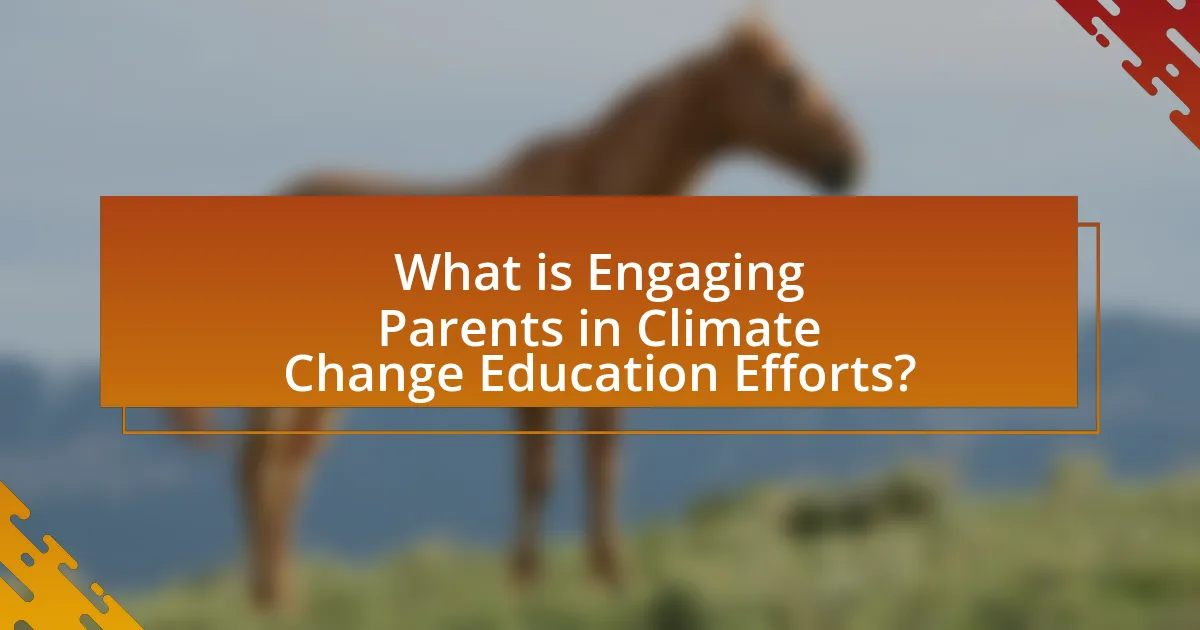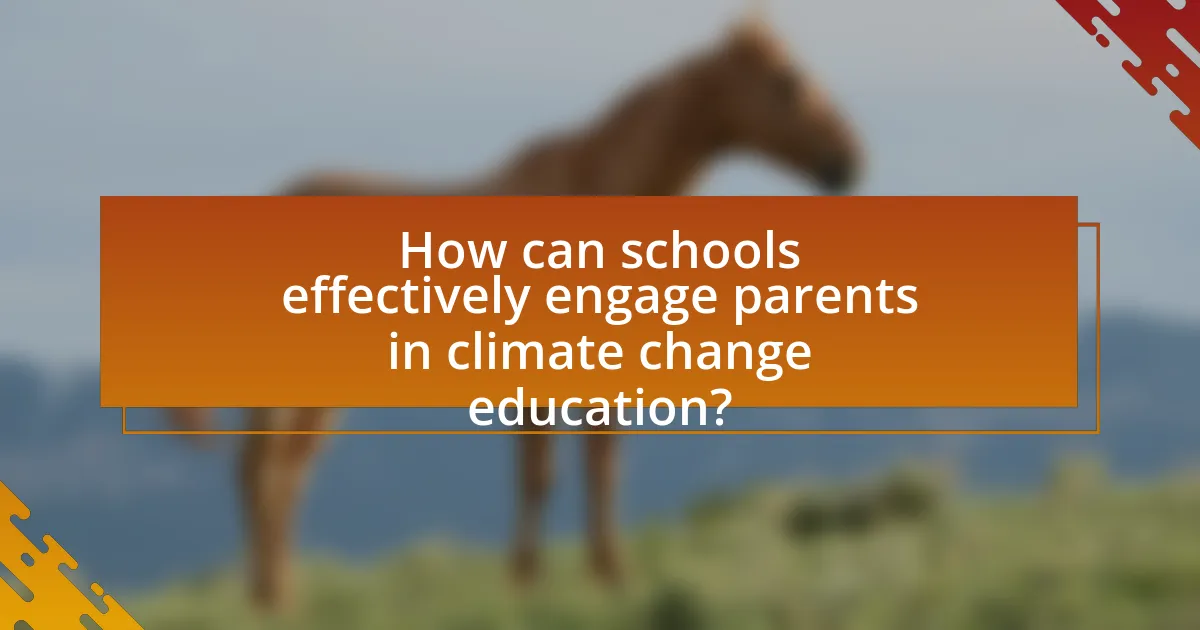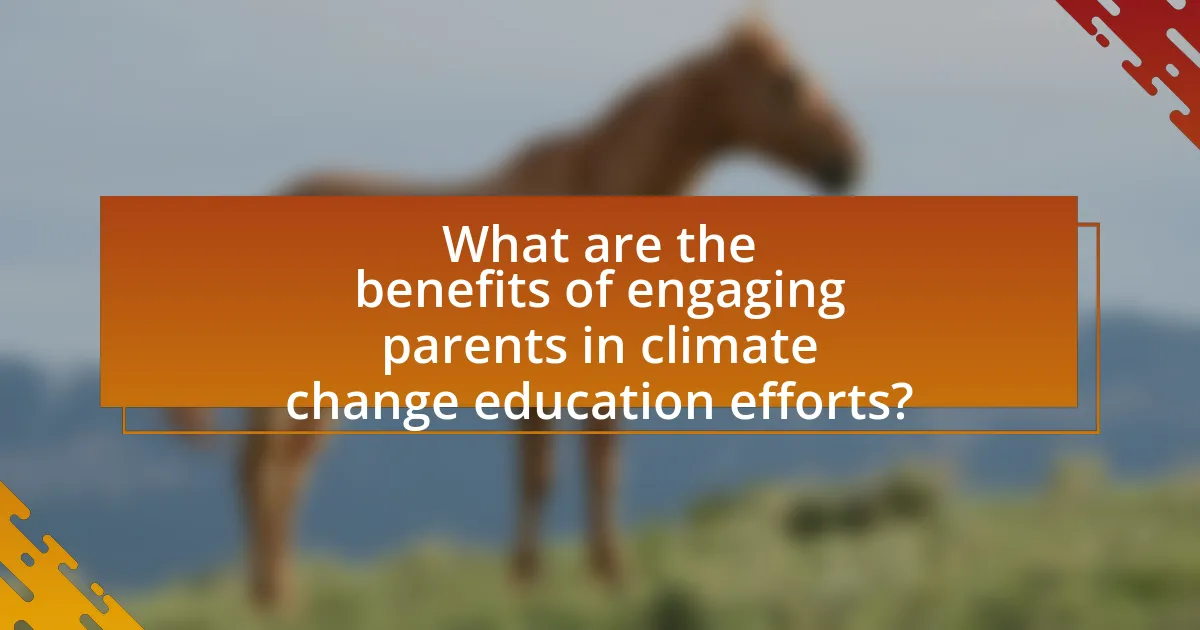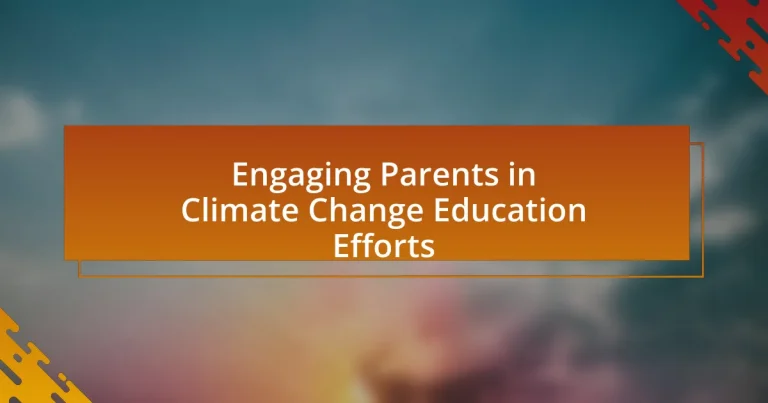Engaging parents in climate change education efforts is a critical initiative aimed at increasing awareness and understanding of climate issues within families and communities. The article outlines the importance of parental involvement in enhancing children’s environmental literacy and fostering sustainable behaviors. It discusses various strategies for schools to effectively engage parents, including workshops, communication channels, and community partnerships, while also addressing challenges such as misconceptions and time constraints. Additionally, the article highlights the positive impact of engaged parents on student outcomes and community action regarding climate change.

What is Engaging Parents in Climate Change Education Efforts?
Engaging parents in climate change education efforts involves actively involving them in initiatives that aim to raise awareness and understanding of climate change issues among families and communities. This engagement can take various forms, such as workshops, informational sessions, and collaborative projects that encourage parents to participate in discussions and activities related to climate change. Research indicates that when parents are engaged, they are more likely to support educational programs and foster environmentally responsible behaviors in their children, thereby amplifying the impact of climate change education. For instance, a study published in the Journal of Environmental Education found that parental involvement significantly enhances children’s knowledge and attitudes towards environmental issues, demonstrating the importance of including parents in these educational efforts.
Why is parental engagement important in climate change education?
Parental engagement is crucial in climate change education because it enhances children’s understanding and commitment to environmental issues. When parents actively participate in educational activities, they reinforce the importance of climate change, fostering a supportive learning environment. Research indicates that children whose parents are involved in their education are more likely to adopt sustainable behaviors and attitudes. For instance, a study published in the Journal of Environmental Education Research found that parental involvement significantly correlates with children’s environmental literacy and proactive behaviors regarding climate action. This engagement not only empowers children but also creates a community-wide dialogue about climate change, amplifying the impact of educational efforts.
How does parental involvement influence children’s understanding of climate change?
Parental involvement significantly enhances children’s understanding of climate change by providing them with direct information, discussions, and modeling of environmentally responsible behaviors. Research indicates that when parents actively engage in conversations about climate change, children are more likely to develop a deeper comprehension of the issue and its implications. For instance, a study published in the journal “Environmental Education Research” found that children whose parents discussed climate-related topics at home demonstrated greater awareness and concern for environmental issues compared to those whose parents did not engage in such discussions. This involvement not only informs children but also fosters critical thinking and encourages them to take action regarding climate change.
What role do parents play in reinforcing climate change education at home?
Parents play a crucial role in reinforcing climate change education at home by actively engaging their children in discussions about environmental issues and modeling sustainable behaviors. By incorporating climate-related topics into daily conversations, parents can enhance their children’s understanding of climate change and its impacts. Research indicates that children are more likely to adopt eco-friendly practices when their parents demonstrate these behaviors, such as recycling, conserving energy, and using public transportation. Furthermore, studies show that parental involvement in environmental education significantly increases children’s awareness and concern for climate issues, fostering a sense of responsibility towards the planet.
What are the challenges in engaging parents in climate change education?
Engaging parents in climate change education faces several challenges, primarily due to varying levels of awareness and understanding of climate issues. Many parents may lack sufficient knowledge about climate change, which hinders their ability to engage meaningfully in educational efforts. Additionally, time constraints and competing priorities often limit parents’ involvement in educational activities related to climate change. Research indicates that parents are often overwhelmed by daily responsibilities, making it difficult for them to prioritize climate education. Furthermore, differing beliefs and values regarding climate change can create resistance to participation, as some parents may not view climate change as a pressing issue. These factors collectively contribute to the challenges in effectively engaging parents in climate change education initiatives.
What misconceptions do parents have about climate change education?
Parents often believe that climate change education is solely the responsibility of schools, leading to a lack of engagement in their children’s learning. This misconception overlooks the critical role that parental involvement plays in reinforcing climate knowledge and fostering environmental stewardship at home. Research indicates that children whose parents actively discuss climate issues are more likely to understand and engage with the topic, highlighting the importance of parental participation in climate change education initiatives.
How can schools address barriers to parental engagement?
Schools can address barriers to parental engagement by implementing flexible communication strategies and providing accessible resources. For instance, schools can utilize various platforms such as emails, text messages, and social media to reach parents effectively, ensuring that information is available in multiple languages to accommodate diverse communities. Research indicates that schools that actively engage parents through regular updates and inclusive events see a 30% increase in participation rates (Henderson & Mapp, 2002). Additionally, offering workshops and informational sessions on climate change education can empower parents with knowledge, making them more likely to engage in their children’s learning. By fostering an inclusive environment and addressing logistical challenges, schools can significantly enhance parental involvement.

How can schools effectively engage parents in climate change education?
Schools can effectively engage parents in climate change education by implementing collaborative programs that involve both students and their families in learning activities. For instance, schools can organize workshops and informational sessions that focus on climate change topics, allowing parents to participate alongside their children, which fosters a shared understanding and commitment to environmental issues. Research indicates that parental involvement in educational activities enhances student learning outcomes and increases awareness of climate change, as seen in studies conducted by the National Parent Teacher Association, which highlight the positive impact of family engagement on educational success. Additionally, schools can utilize digital platforms to share resources and updates on climate initiatives, ensuring that parents remain informed and actively involved in ongoing discussions about climate change.
What strategies can be implemented to involve parents?
To involve parents in climate change education efforts, schools can implement strategies such as organizing workshops, creating communication channels, and facilitating volunteer opportunities. Workshops can educate parents on climate issues and provide them with tools to discuss these topics with their children, fostering a collaborative learning environment. Establishing communication channels, such as newsletters or social media groups, allows for ongoing dialogue and sharing of resources related to climate education. Additionally, facilitating volunteer opportunities for parents in school projects related to sustainability can enhance their engagement and investment in their children’s learning. Research indicates that parental involvement significantly enhances student achievement and motivation, making these strategies effective in promoting climate change education.
How can schools create informative workshops for parents?
Schools can create informative workshops for parents by collaborating with experts in climate change education to develop relevant content. This collaboration ensures that the workshops provide accurate and actionable information on climate change, its impacts, and ways families can contribute to sustainability efforts. For instance, schools can invite local environmental organizations to lead sessions, which can enhance credibility and provide parents with practical strategies for reducing their carbon footprint. Research indicates that parental involvement in educational initiatives significantly boosts student engagement and understanding of climate issues, as highlighted in the study “The Role of Parents in Climate Change Education” published in the Journal of Environmental Education Research.
What role do community partnerships play in engaging parents?
Community partnerships play a crucial role in engaging parents by providing resources, support, and opportunities for collaboration in climate change education efforts. These partnerships facilitate communication between schools, local organizations, and families, ensuring that parents are informed and involved in educational initiatives. For instance, research indicates that when schools collaborate with community organizations, parents are more likely to participate in programs that address climate change, leading to increased awareness and action within families. This engagement is essential for fostering a collective response to climate issues, as evidenced by studies showing that community involvement enhances parental participation and commitment to educational goals.
How can technology be utilized to enhance parental engagement?
Technology can enhance parental engagement by providing accessible communication platforms that facilitate real-time updates and interactions between educators and parents. For instance, mobile applications and online portals allow parents to receive notifications about their child’s progress, upcoming events, and educational resources related to climate change. Research indicates that schools utilizing such technology report increased parental involvement, with a study by the National Center for Education Statistics showing that 90% of parents who used school communication apps felt more connected to their child’s education. This connection fosters a collaborative environment where parents can actively participate in climate change education initiatives, reinforcing the importance of their involvement in their children’s learning experiences.
What digital tools can facilitate communication between schools and parents?
Digital tools that can facilitate communication between schools and parents include platforms such as Schoology, ClassDojo, and Remind. These tools enable real-time messaging, assignment updates, and event notifications, fostering a collaborative environment. For instance, Schoology allows teachers to share resources and grades, while ClassDojo promotes positive behavior reinforcement and parent engagement through updates on student progress. Remind provides a simple way for teachers to send messages directly to parents, ensuring they stay informed about school activities and their child’s learning. These tools have been shown to enhance parental involvement, which is crucial for effective climate change education efforts, as engaged parents can support their children’s learning and advocacy in environmental issues.
How can online resources support parents in climate change education?
Online resources can support parents in climate change education by providing accessible information, interactive tools, and community engagement platforms. These resources include educational websites, online courses, and social media groups that offer up-to-date scientific data, practical tips for sustainable living, and strategies for discussing climate issues with children. For instance, platforms like NASA’s Climate Kids and the Environmental Protection Agency’s resources provide age-appropriate content that helps parents explain complex climate concepts to their children. Additionally, online forums and webinars allow parents to connect with experts and other families, fostering a collaborative learning environment that enhances their understanding and ability to educate their children about climate change.

What are the benefits of engaging parents in climate change education efforts?
Engaging parents in climate change education efforts enhances children’s understanding and commitment to environmental issues. When parents participate, they reinforce the lessons learned in school, creating a consistent message about the importance of sustainability. Research indicates that children whose parents are involved in educational initiatives are more likely to adopt eco-friendly behaviors, as evidenced by a study published in the Journal of Environmental Education, which found that parental engagement significantly increases children’s environmental knowledge and action. Additionally, parents can serve as role models, demonstrating sustainable practices at home, which further solidifies the educational impact.
How does parental engagement impact student outcomes?
Parental engagement significantly enhances student outcomes by fostering academic achievement, improving behavior, and increasing motivation. Research indicates that students with involved parents are more likely to earn higher grades, have better attendance, and exhibit positive attitudes toward school. For instance, a study published in the “Review of Educational Research” found that parental involvement correlates with a 10% increase in student achievement across various subjects. Additionally, engaged parents can provide support for learning at home, which further reinforces educational success.
What evidence supports the link between parental involvement and student success in climate change education?
Parental involvement significantly enhances student success in climate change education, as evidenced by various studies. Research conducted by the National Parent Teacher Association indicates that students whose parents are actively engaged in their education tend to achieve higher academic performance and demonstrate greater interest in environmental issues. Additionally, a study published in the Journal of Environmental Education Research found that when parents participate in climate-related activities, such as school projects or community initiatives, students show improved understanding and retention of climate change concepts. These findings underscore the critical role that parental engagement plays in fostering effective climate change education.
How can engaged parents contribute to community awareness and action on climate change?
Engaged parents can significantly contribute to community awareness and action on climate change by actively participating in educational initiatives and advocacy efforts. By organizing workshops, attending community meetings, and collaborating with local schools, parents can disseminate information about climate change impacts and solutions. Research indicates that parental involvement in environmental education enhances children’s understanding and encourages families to adopt sustainable practices, thereby fostering a culture of environmental responsibility within the community. For instance, a study published in the Journal of Environmental Education found that communities with engaged parents showed a 30% increase in participation in local sustainability programs.
What best practices can schools adopt for successful parental engagement?
Schools can adopt several best practices for successful parental engagement, including regular communication, involvement in decision-making, and providing educational resources. Regular communication through newsletters, emails, and meetings keeps parents informed about school activities and their child’s progress, fostering a sense of community. Involving parents in decision-making processes, such as curriculum development or school events, empowers them and enhances their investment in the school. Additionally, providing educational resources related to climate change can equip parents to engage in discussions at home, reinforcing the school’s efforts in climate change education. Research indicates that schools with strong parental engagement see improved student outcomes, highlighting the importance of these practices.
How can schools measure the effectiveness of their engagement strategies?
Schools can measure the effectiveness of their engagement strategies by utilizing surveys, attendance records, and academic performance metrics. Surveys can assess parent satisfaction and involvement levels, while attendance records can indicate participation in school events and meetings. Academic performance metrics can reveal correlations between parental engagement and student outcomes, providing concrete evidence of the impact of these strategies. For instance, a study by the National Education Association found that increased parental involvement is linked to higher student achievement, reinforcing the importance of measuring engagement effectiveness through these methods.
What ongoing support can schools provide to parents after initial engagement efforts?
Schools can provide ongoing support to parents after initial engagement efforts by offering regular communication, resources for climate change education, and opportunities for involvement in school activities. Regular communication can include newsletters, emails, and meetings that keep parents informed about climate-related initiatives and educational programs. Providing resources such as workshops, informational materials, and access to online platforms can empower parents to engage in climate change discussions at home. Additionally, schools can create opportunities for parents to participate in school events, volunteer for projects, or join committees focused on sustainability, fostering a collaborative environment that enhances parental involvement in climate change education.
What practical tips can parents use to support climate change education at home?
Parents can support climate change education at home by integrating discussions about climate issues into daily conversations. This can include talking about the impact of climate change on local weather patterns, wildlife, and community health. Engaging children in activities such as recycling, gardening, or using energy-efficient appliances reinforces the importance of sustainable practices. Research shows that children who participate in hands-on environmental activities are more likely to develop a strong understanding of climate issues and a commitment to sustainability. Additionally, utilizing educational resources like books, documentaries, and online courses can enhance children’s knowledge and awareness of climate change.


